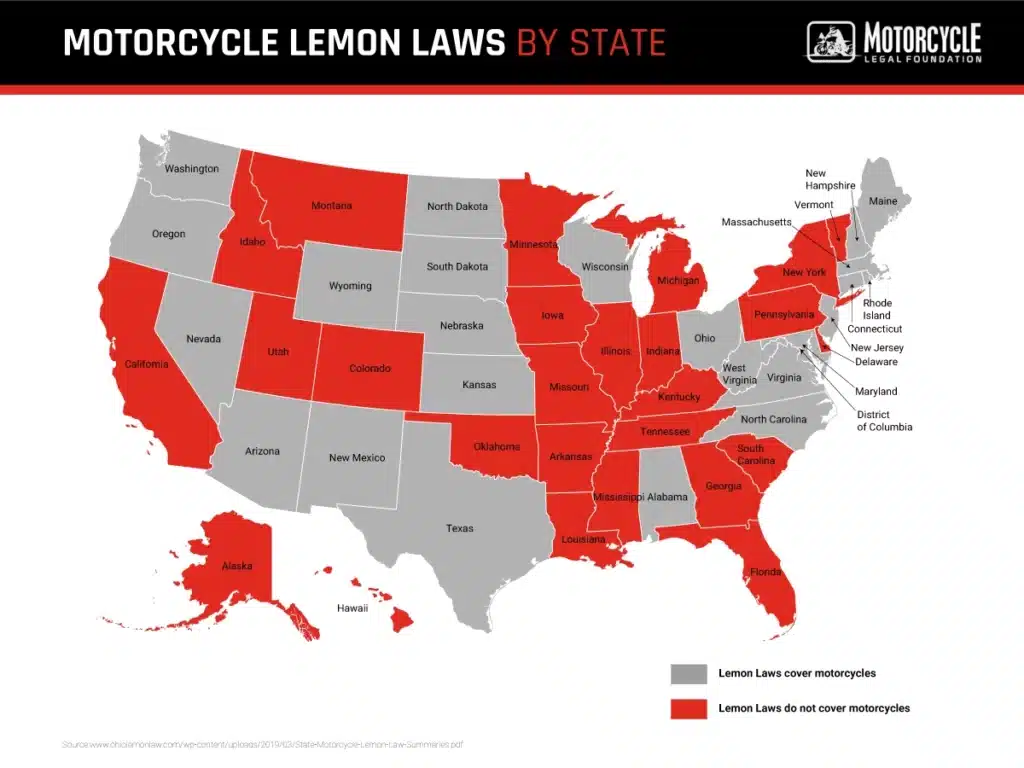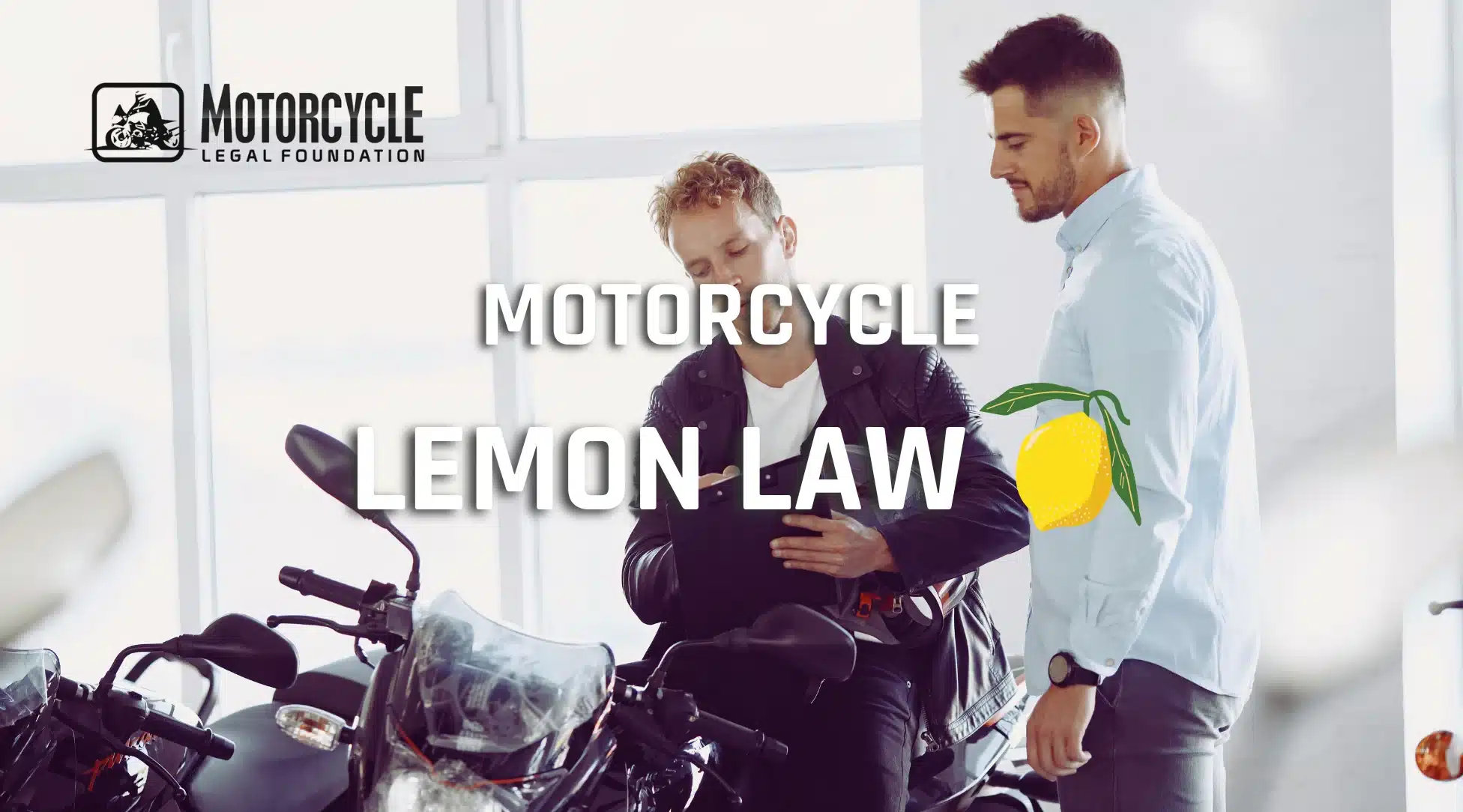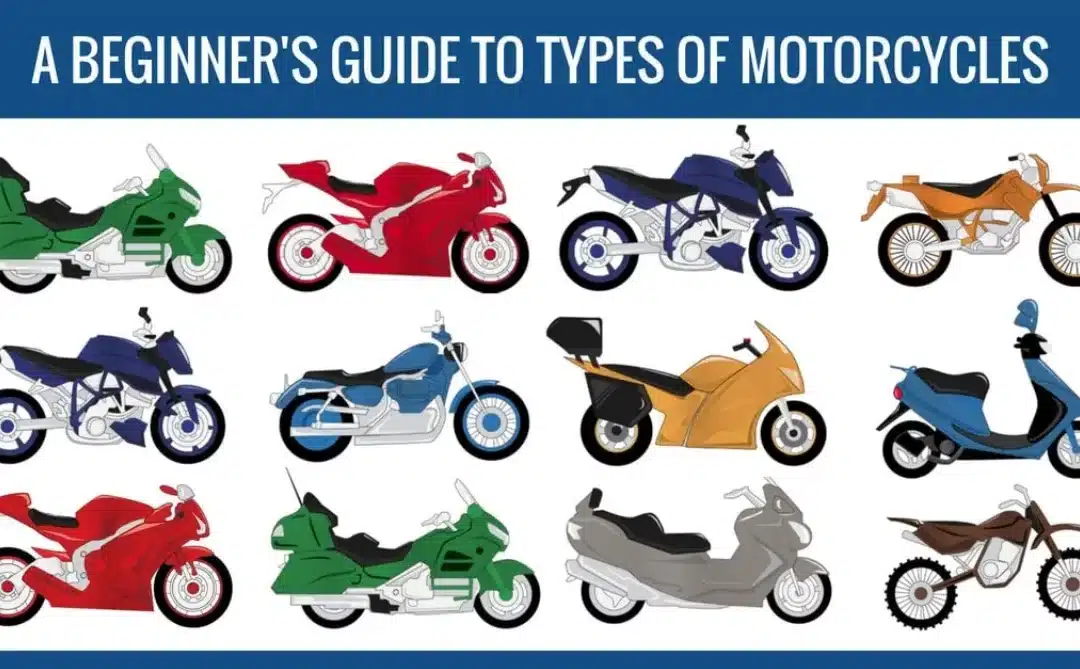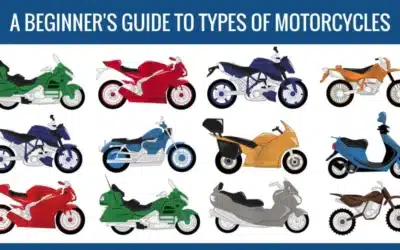“Excitement” is the best way to describe getting a new motorcycle, and it doesn’t matter whether it’s a new bike or a used one. However, nothing takes the fun and enjoyment out of motorcycle ownership than discovering that your new motorcycle has mechanical or safety problems. It only worsens when the dealership’s mechanics cannot correct the issue after repeated attempts.
We know how frustrating it can be, so we want you to know you may have rights under the motorcycle lemon law of your state. Lemon laws exist to help consumers who purchase motorcycles with mechanical and safety issues that have been the subject of multiple unsuccessful repair attempts.
State laws differ in defining a vehicle that qualifies as a “lemon.” The general requirement is that a motorcycle must have a mechanical or safety problem that has been the subject of multiple unsuccessful repair attempts or has been out of service for a specific number of days. The remedy for owners of motorcycles qualifying as a lemon is typically to have it repurchased by the manufacturer or accept a replacement.
As you continue reading, you’ll learn more about the guidelines a motorcycle must meet to qualify as a lemon. We’ll also offer you a glimpse at some of the motorcycle lemon laws nationwide.
What are motorcycle lemon laws?
All states have some form of consumer protection law protecting the rights of people who purchase a motor vehicle only to discover that it has a mechanical or other defect that significantly affects its performance. These laws have come to be known as “lemon laws.”
State lemon laws typically only apply to vehicles covered under a manufacturer’s warranty. If your motorcycle is a lemon, the remedy is to accept a replacement motorcycle or sell the defective one back to the manufacturer. The laws include dispute resolution procedures through the courts or arbitration.
Each state has its definition of the defects and conditions that make a motorcycle a lemon under the law. The general rule in use is the number of unsuccessful repair attempts or the number of days that a vehicle is out of service. For example, California law presumes that a vehicle qualifies as a lemon when at least four unsuccessful attempts by a dealer to repair the defect or the motorcycle has spent at least 30 nonconsecutive days in the repair shop.
Lemon laws provide consumers with necessary rights, so it is essential to have at least a basic understanding of the laws in your state and how to enforce your rights under them. For instance, most state laws limit how long you have to file a motorcycle lemon law claim, so you could lose your right to protection through the motorcycle lemon law by waiting too long before taking your bike to a dealer for repairs.
For example, California residents have just four years to file a claim for replacement or compensation for mechanical issues and other defects occurring within the first 18 months of ownership. The remainder of this article gives the information you’ll need to determine if you have a bike that qualifies for replacement or compensation and how to enforce your rights.
Is your motorcycle a lemon?
Whether you have a lemon law motorcycle depends on the wording of the law. Some states, such as New York, have lemon laws for cars and SUVs that specifically exclude motorcycles. If you live in one of these states, you may have a remedy through the Magnuson-Moss Warranty Act.
The federal law, which some people call a federal lemon law, gives a consumer the right to sue the manufacturer of a defective motorcycle for breach of warranty. If the manufacturer is unable or unwilling to repair the issue with your motorcycle, you have a right to sue to recover damages.
If you live in a state with motorcycle lemon laws, the first thing to do is review the law to determine whether you qualify to file a claim. As a general rule, a motorcycle must meet the following conditions to be eligible for replacement or compensation through the lemon law:
- The motorcycle must be for personal use.
- It must be covered under a written warranty.
- There must be one or more defects impairing its use or value.
- Multiple unsuccessful repair attempts by the dealer or manufacturer or been out of service for an extended period as specified in the statute.
- The motorcycle’s mechanical or other defective condition cannot result from an accident, abuse, or poor maintenance.
You must bring the defect to the attention of the dealer or manufacturer right away to maintain your rights under the lemon law. For example, California motorcycle lemon law claims must be brought within four years from when it first arose. The law also requires that the defect be present during the first 18 months or 18,000 miles, whichever comes first, to be eligible for lemon law relief. Laws change, so check your state’s most recent version of the motorcycle lemon law to find the requirements for filing a claim.
You may not be eligible to file a lemon law claim for damage to your motorcycle in a crash, but you should arrange a consultation with a personal injury lawyer. You may be able to recover the cost of repairs through a lawsuit filed against the person responsible for causing the accident.
Need Motorcycle Insurance?
Enjoy your ride while feeling safe with the best insurance coverage.
State-by-state motorcycle lemon laws

As previously mentioned, some state lemon laws do not cover motorcycles. These include the following:
- Arkansas
- California
- Colorado
- Delaware
- District of Columbia
- Florida
- Hawaii
- Idaho
- Indiana
- Iowa
- Kentucky
- Michigan
- Mississippi
- Missouri
- Montana
- New York
- Pennsylvania
- South Carolina
- Utah
- Vermont
However, some states, such as California and South Carolina, provide remedies for owners of motorcycles with mechanical and safety defects through other laws. Instead of a motorcycle lemon law per se, California treats motorcycles as consumer goods so that you can obtain replacement or compensation for a defective bike through a warranty claim under the law. South Carolina takes a similar approach to protect owners of motorcycles.
A complete listing of states with motorcycle lemon laws is available, but here are a few examples:
- Alabama: You need at least three unsuccessful repair attempts to qualify under the lemon law. The statute also lets you qualify based on the length of time your bike is out of service while in the shop for repairs.
- Arizona: A motorcycle is presumed to be a lemon after at least four unsuccessful attempts at repairing it or at least 30 days out of service the earlier of two years or 24,000 miles.
- Maryland: The presumption that a motorcycle is a lemon applies after four unsuccessful repair attempts or 30 days out of service. The law also presumes that a motorcycle is a lemon after only one unsuccessful attempt at repairing a problem with its steering or brakes within 15 months or 15,000 miles, whichever comes first.
- Washington: A motorcycle must go through at least four unsuccessful attempts on behalf of the manufacturer, which is usually at a dealer’s repair shop, to be eligible for lemon law remedies. Only two unsuccessful repair efforts are required for safety defects. As with the laws in other states, your motorcycle may qualify as a lemon based on the number of days in the shop.
- Wyoming: Three unsuccessful repair attempts or 30 business days out of service during 12 months qualifies for lemon law relief.
All states require you to give the manufacturer notice of the defect and an opportunity to repair the motorcycle. There may need to be more than just bringing it into the dealer for repair to satisfy the notice requirement of states, such as Wyoming, whose laws call for written notice directly to the manufacturer.
If you’re having mechanical or safety issues with a recently purchased or leased motorcycle, consulting a lawyer with experience handling legal issues related to motorcycle ownership can be beneficial. A lawyer knows the laws in your state and what it takes to protect and enforce your rights under them.
Takeaways
If you buy or lease a motorcycle only to discover mechanical or safety issues affecting its use or value, you may have a remedy through your state’s motorcycle lemon laws. To benefit from the law in your state, you must understand how it works and comply with its requirements. Failing to do so could mean the loss of the remedies available under the law, including replacement or monetary compensation for a defective bike.
Laws are complex and frequently change, so contact a lawyer who handles accidents and other motorcycle-related legal matters affecting riders and owners. A consultation with a lawyer gives you current information about motorcycle lemon law in your state and options for enforcing your rights.
Seeking Legal Assistance for Your Motorcycle Lemon Law Case?
Our expert lemon law attorneys are here to help you navigate the complexities of your case and fight for your rights.








